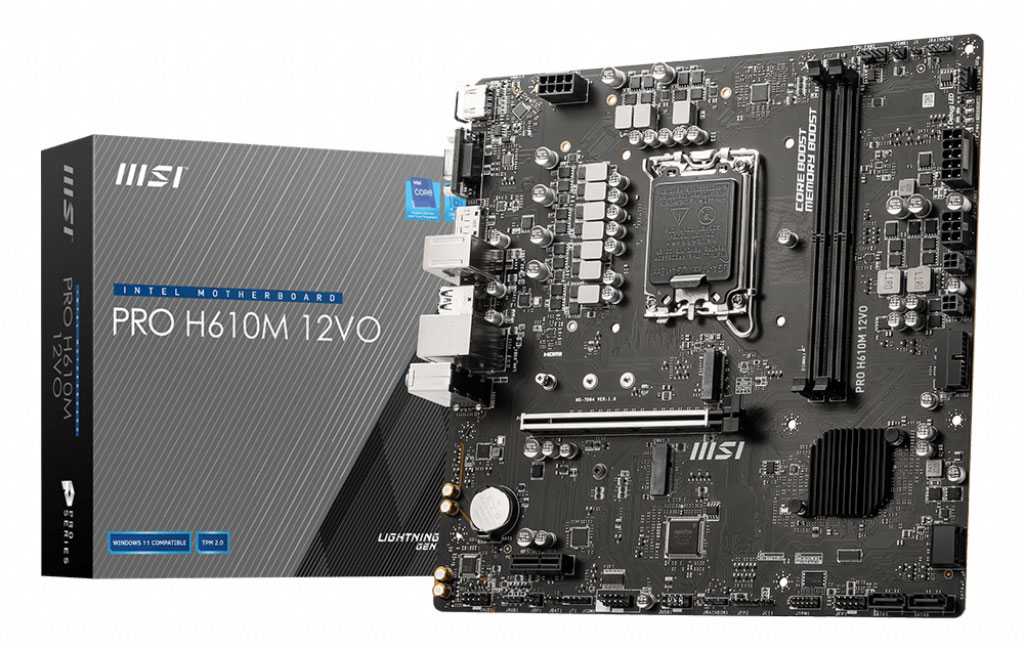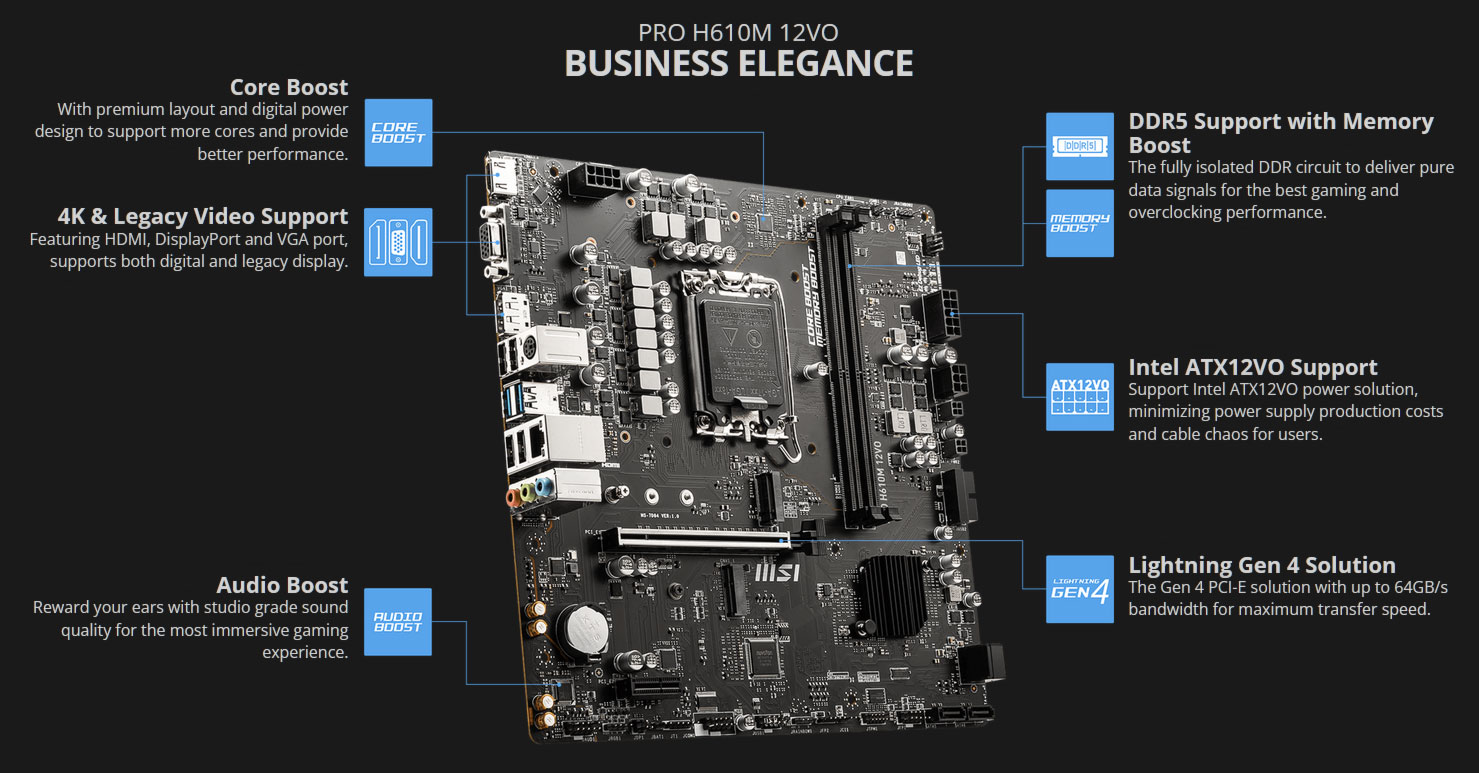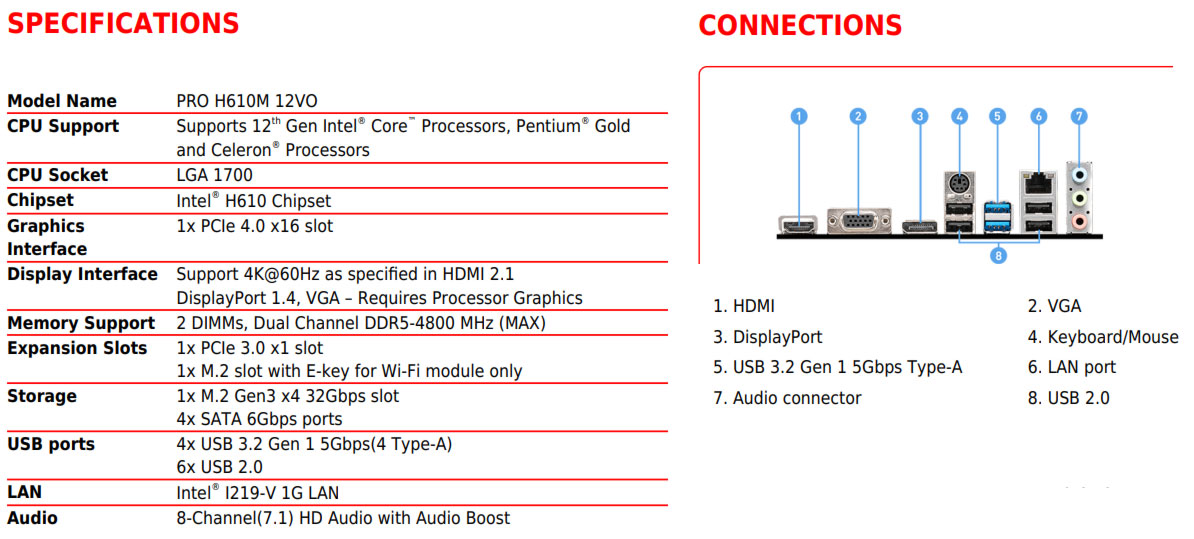MSI's H610 Motherboard Debuts With ATX12VO Connector
It's finally out.
Get Tom's Hardware's best news and in-depth reviews, straight to your inbox.
You are now subscribed
Your newsletter sign-up was successful
MSI looks set to roll out its first H610 chipset motherboard with support for the ATX12VO power connector standard. The MSI Pro H610M 12VO featured briefly in an MSI Insider broadcast in mid-January when mainstream Alder Lake processors were fresh, but only now is it being readied for retail, with its product page providing a features overview, gallery, and full specs. In January, we thought this might become a system integrators only product, but its appearance on the consumer site confounded this notion.
H610 motherboards aren't usually considered with much interest by PC enthusiasts due to their minimal specs, but this one deserves merit for keeping Intel's single-rail ATX12VO power delivery standard alive.
MSI highlights the benefits of ATX12VO on the new motherboard's product pages. It says the relatively new power solution's appeal is that it "minimizes power supply production costs and cable chaos for users." That kind of product pruning usually appeals to systems makers, buying hundreds or thousands of identical components. However, while potentially making your PSU cheaper, the ATX12VO standard will probably be slightly more expensive than other H610 boards due to the need for additional DC-to-DC converters onboard.



The component costs balancing act might make ATX12VO sound pointless, but its adoption has some other benefits. For starters, the ATX12VO connector is more compact than the ATX power in that it replaces for improved board space use. ATX12VO is also supposed to be more power efficient by converting 2V to 5V and 3.3V on the motherboard and is claimed to be particularly good at reducing idle power. Lastly, necessary PSUs shouldn't just be cheaper; they should be simpler too.
Turning to the rest of the MSI Pro H610M 12VO specs, they are minimal. Users can access two DIMM slots for up to 64GB of DDR5-4800 memory. For expansion, there is one PCI-E x16 and one PCI-E x1 slot. You can plug in up to four SATA III drives, but only one PCIe 3.0 x4 M.2 slot is available for storage. Check out the data sheet image below for a complete overview of expansion options, connectors, and features.
At the time of writing, we still don't have any specific availability date or pricing indicators for the MSI Pro H610M 12VO. Of course, your PSU choice will be slim too, but if you have a modular PSU, it is possible to buy an adapter.
In related news, Intel advanced the ATX12VO specification to v2 in March this year. The main change was adding a new 12+4-pin 12VHPWR connector (part of the ATX 3.0 standard) which can power add-in-cards of up to 150W, 300W, 450W, or 600W. So it could be convenient for your next-generation GPU.
Get Tom's Hardware's best news and in-depth reviews, straight to your inbox.

Mark Tyson is a news editor at Tom's Hardware. He enjoys covering the full breadth of PC tech; from business and semiconductor design to products approaching the edge of reason.
-
King_V I think I'm pretty on board with this overall. And, I would imagine that using old PSUs, even non-modular ones, wouldn't be a problem. After all, they have adapters to do 24-pin ATX to those wacky 8-pin Dell 12V connectors. Making such an adapter to the 10-pin one shouldn't be any harder.Reply
Losing the added bulk of the current 24-wire cable is a big plus, I think. -
hotaru251 ReplyMSI highlights the benefits of ATX12VO on the new motherboard's product pages. It says the relatively new power solution's appeal is that it "minimizes power supply production costs and cable chaos for users."
sure do love information thats not the full story.
PSU are the CHEAPEST part of a PC...even storage costs more...heck you can get cheap PSU for less than some pc case fans.
Yes, it will make PSU production cost less, but there is no reason the makers will reduce price (face it..its corporate greed).
Furthermore it instead pushes the "saving" from the PSU to the MB to cover the removed PSU features...thus rising MB costs. (arguably the 2nd or 3rd most expensive part of a build)
Really wish there were global laws to punish companies that say selective information as it doesnt tell whole story. -
BillyBuerger Replyhotaru251 said:...PSU are the CHEAPEST part of a PC...even storage costs more...heck you can get cheap PSU for less than some pc case fans...
If you're buying PSUs that cost less than fans, then 12VO isn't your issue. Friends don't let friends buy cheap PSUs.
I'm exited to see this happening. Still need to see what the PSU makers are going to put out as well. Adapters are good for getting through the transition but actually 12VO PSUs are needed to get the full advantage of this. -
Ogotai Reply
heh, and thats the part of the comp, one shouldn't be skimping on.hotaru251 said:PSU are the CHEAPEST part of a PC. -
AgentBirdnest Reply
Yeah, truly... skimping on storage or a fan doesn't run the risk of blowing the whole system.Ogotai said:heh, and thats the part of the comp, one shouldn't be skimping on.
bad memories of that lady's computer exploding when I plugged in my external drive to back up her files] ... A bright blue flash and a shower of sparks flying out the PSU nearly set the curtains on fire. Destroyed every component except for, amazingly, her hard drive - which was the only thing she cared about. phew. I tell that story to every friend who asks for build advice, to scare them straight. -
InvalidError Reply
What sort of fans are you buying? The cheapest remotely decent quality PSUs on the market today cost around $60. If you want something worth trusting modern-day mid-range CPUs and GPUs to, you are looking at $80+ and may still run into issues with transients. If you bump the low bar to meeting the new ATX 3.0 or 12VO 2.0 specs, you are likely looking at a $100 starting point.hotaru251 said:PSU are the CHEAPEST part of a PC...even storage costs more...heck you can get cheap PSU for less than some pc case fans.
As for moving 3.3V and 5V to the motherboard, this is only temporary. Sooner or later, all still relevant interfaces will get a makeover and become 12VO along the way just like DDR5 just did. The legacy stuff will get delegated to adapters for those who still need them just like it always has. SATA ports go away? Type-C can easily do 12V/3A and 5-20Gbps, more than enough to provide power+data to the SATA bridge and HDD/ODD/SSD. Need to plug in a legacy 3.3V NVMe SSD? You can still get up to 40Gbps from an NVMe adapter plugged into a USB4/TB4 port and I'm sure some companies will also make adapter boards to bodge 3.3V NVMe into 12V NVMe slots too.
The transition from AT to ATX didn't happen overnight, neither did the phasing out of -12V and -5V rails which only became 'optional' in 2002. -
hotaru251 Reply
ofc not it was example.BillyBuerger said:If you're buying PSUs that cost less than fans, then 12VO isn't your issue. Friends don't let friends buy cheap PSUs.
PSU are already cheap. making em cheaper but making MB mroe expensive is wrong way to do it.
i'd ratehr trust a premium PSU over a MB to manage my voltages.
again sub $100 even on high end of quality.Ogotai said:thats the part of the comp, one shouldn't be skimping on.
i didnt say I was buying em.InvalidError said:what sort of fans are you buying?
I said you COULD get cheap (but reliable) PSU for less than fans.
my comment wasnt about quality. It was price.
you can get a safe and name brand PSU for under $80.
corsair's CX 650M for example is think like 650w (overkill for budget, fine for mid budget build which is likely most consumer focused) for $60.
Do you NEED cheaper PSU's? (again they dont even have reason to lower prices to the customer and just pocket the price saved)
While the MB costs $100+ even now for anythign but the lowest end ones with largely cut down specs & will only get more expensive due to having to include new power rails.
We alreayd have some MB's in 4 digit price range.
any mid tier is aroudn $200 range.
I'd rather replace a PSU that dies than the MB that dies due to issue in the power delivery. -
InvalidError Reply
As I wrote earlier, 12VO will ultimately eliminate those intermediate DC-DC converters when interfaces get their next refresh and almost certainly get 12VO power along the way. Everything that gets 5V and 3.3V power uses local DC-DC converters to further step that down to 0.8-1.8V anyway, moving those to 12V eliminates an unnecessary intermediate conversion, which will ultimately make things cheaper, more efficient and more reliable. Just need to get to the other side of the transition period.hotaru251 said:I'd rather replace a PSU that dies than the MB that dies due to issue in the power delivery.
Motherboards already have 20+ local DC-DC converters for various things and are about to get a whole lot more with type-C/USB4/TB4 requiring per-port DC-DC converters for USB-PD. Two or three more for legacy non-12VO devices until those ports are phased out are not a big deal in the grand scheme of things.
The next cycle of progress and legacy-shedding to avoid piling up obsolete crap has to start somewhere.
And from the HPWR spec, the 48VHPWR option looks like a hint that the next step after 12VO could be 48V. Makes sense if you want PCs with type-C video outputs to support 240W USB-PD for bus-powered monitors and other relatively high-power devices including bus-powered hubs that can pass power to further USB-PD devices.